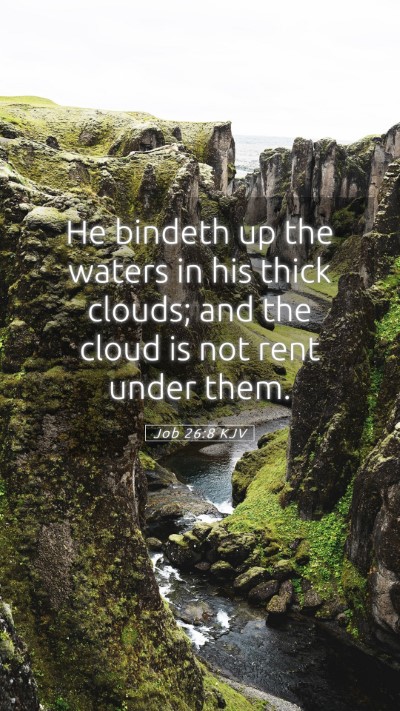Old Testament
Genesis Exodus Leviticus Numbers Deuteronomy Joshua Judges Ruth 1 Samuel 2 Samuel 1 Kings 2 Kings 1 Chronicles 2 Chronicles Ezra Nehemiah Esther Job Psalms Proverbs Ecclesiastes Song of Solomon Isaiah Jeremiah Lamentations Ezekiel Daniel Hosea Joel Amos Obadiah Jonah Micah Nahum Habakkuk Zephaniah Haggai Zechariah MalachiJob 26:8 Meaning
What is the meaning of Job 26:8?
He bindeth up the waters in his thick clouds; and the cloud is not rent under them.
Job 26:8 Bible Verse Meaning
Understanding Job 26:8 - A Comprehensive Bible Verse Commentary
Verse: Job 26:8 - "He bindeth up the waters in his thick clouds; and the cloud is not rent under them."
The verse reflects the majesty and power of God in creation, particularly His control over nature. In this passage, Job speaks to the might of God, emphasizing His omnipotence in the natural world. The imagery of God binding the waters in thick clouds illustrates both His authority and the delicate balance He maintains in nature.
Key Themes:
- God's Sovereignty
- The Majesty of Creation
- The Power of God's Word
Bible Verse Meanings
As we explore the meanings of Bible verses, it is essential to acknowledge the context of Job’s journey. Job, a man tested by suffering, seeks to understand the nature of God and His purposes. In this passage, he reflects on the greatness of God, asserting that despite his dire circumstances, God remains in complete control of the universe.
Bible Verse Interpretations
Several public domain commentaries offer insights into this verse:
- Matthew Henry: Henry emphasizes the incredible wisdom and power of God. He notes that even the clouds, which hold vast amounts of water, do not break apart because of God's design. This showcases God’s meticulous control over creation and His providential care.
- Albert Barnes: Barnes interprets this verse as an acknowledgment of God's omnipotent governance. He states that the reference to clouds signifies the potential for rain and sustenance of life, demonstrating God’s provision and control over the elements.
- Adam Clarke: Clarke suggests that this verse speaks to God’s capability to hold together the elements of creation. He remarks that this showcases the mystery of nature, where God’s invisible hand still operates within visible phenomena.
Understanding Scripture
In scripture analysis, scholars highlight how Job 26:8 ties into the larger narrative of Job's discourse on God’s omnipotence. Throughout the book of Job, questions arise about suffering, justice, and the nature of God. This verse serves as a reaffirmation of faith in God's ultimate authority.
Biblical Exegesis
This verse stands as a testimony to the character of God. His ability to “bind up the waters” underlines not only His power but also His wisdom in creation. The clouds, representing uncertainty and tumult in life, remain steady and stable under God's command. This brings comfort to those who seek to understand their own struggles within the context of God’s sovereignty.
Bible Study Insights
For bible study groups, this verse can be a focal point for discussion on God’s authority over the natural world. Participants can explore how this understanding influences their view of current events and personal hardships. In this light, Job’s declaration can inspire hope and steadfastness in faith.
Application of Bible Verses to Daily Life
The verse also prompts believers to reflect on daily life applications. Understanding that God is in control encourages trust in His divine plan. During turbulent times, believers can find assurance in the fact that nothing happens outside of God's knowledge and control.
Cross References
- Psalm 104:3-4 - God’s creation and command over nature
- Isaiah 40:22 - God as the Creator, stretching out the heavens
- Proverbs 8:28 - The established waters and skies during creation
Conclusion
In conclusion, Job 26:8 provides profound insights into God’s nature and His workings in the universe. Through the lenses of various commentaries, believers can glean much about the sovereignty of God and the assurance it brings to their lives. Whether in personal reflections or communal studies, this verse invites deeper Bible study insights and an enriched understanding of God’s character.


